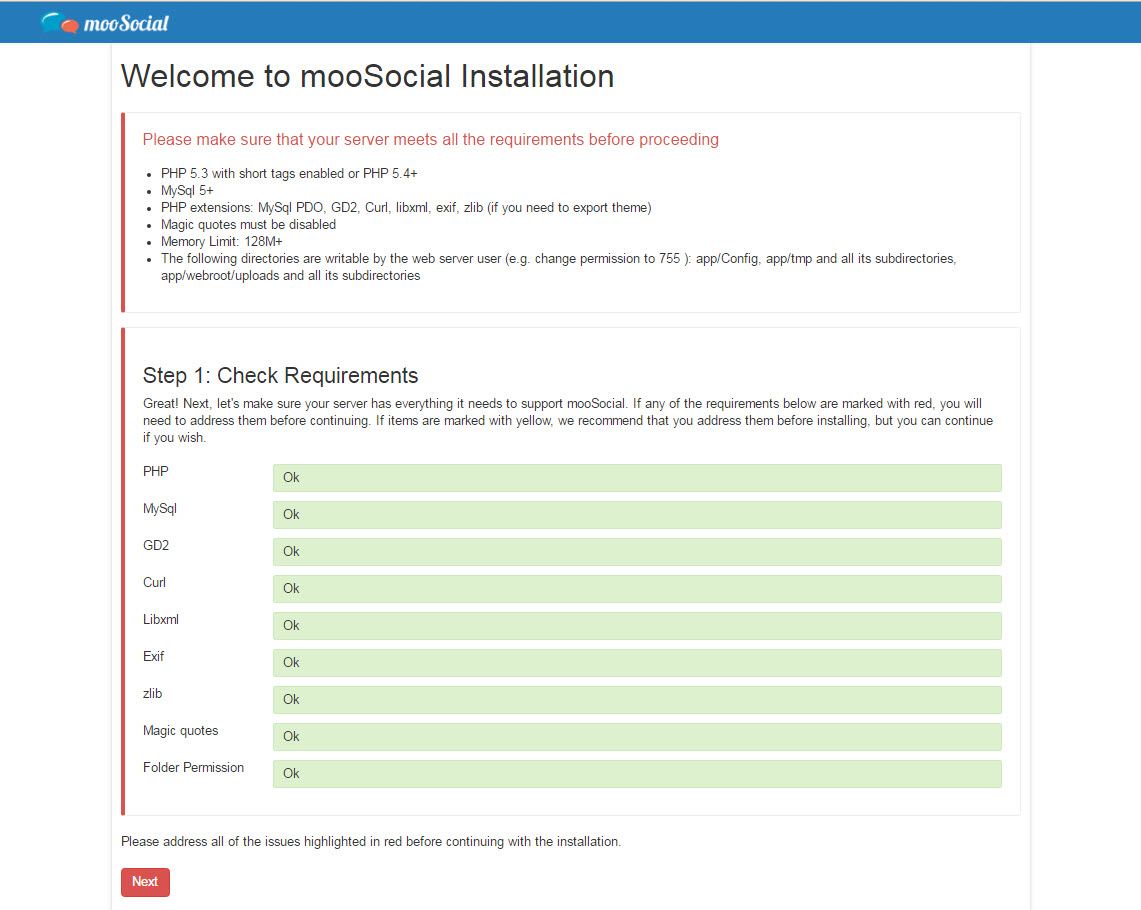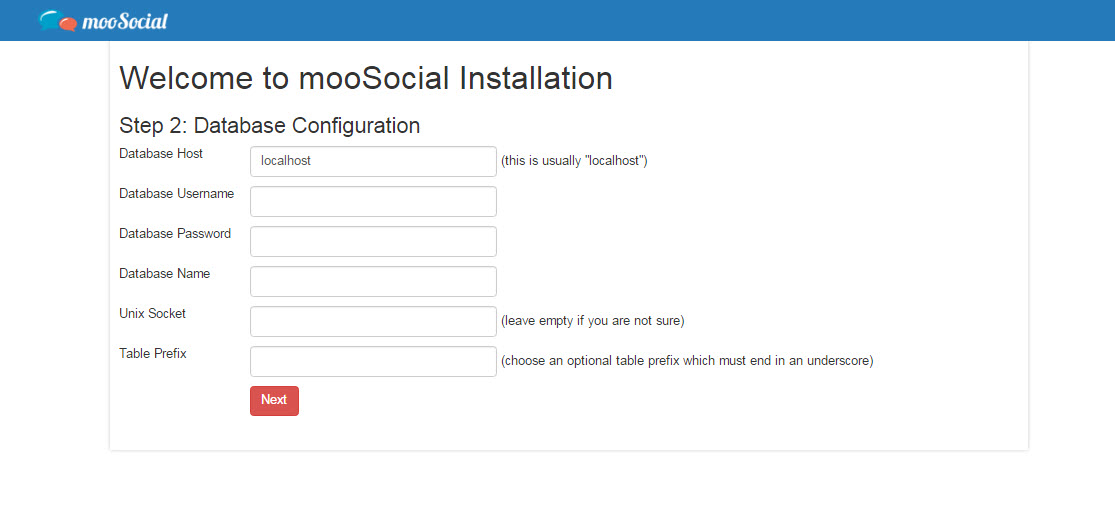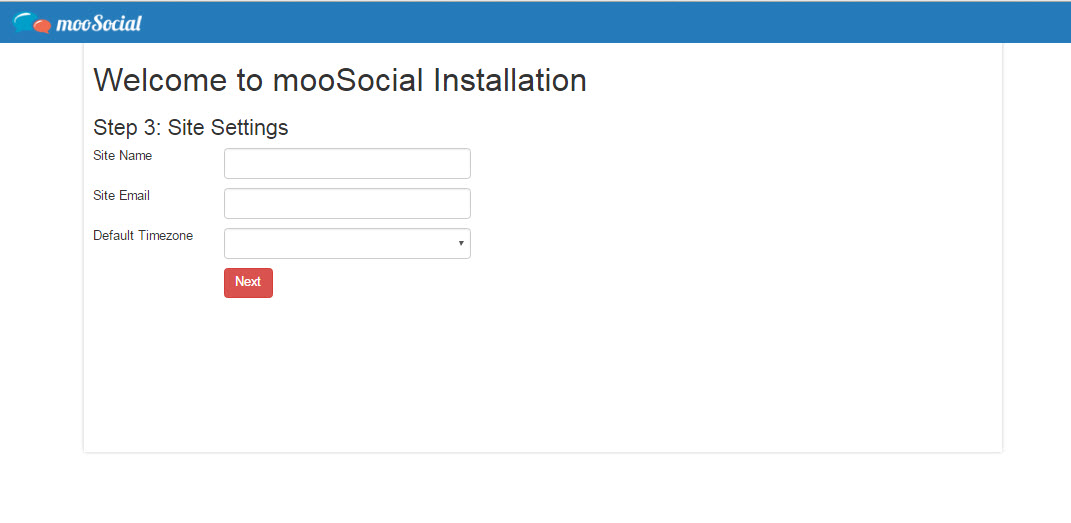menu
menu
Menu
In most cases, installing mooSocial is a very simple process which takes only a few minutes to complete. Before the install there are a few things you need to know and do before the installation process.
By default, mooSocial is shipped with mod_rewrite enabled. If you are not installing mooSocial on apache server or your server does not have mod_rewrite, please read the last section of this guide. Or if your server is not running apache and you still want to use mod_rewrite, check out “Installing mooSocial without mod_rewrite” section.
Upload files and folders within mooSocial Directory to the desired location on your web server
Note: If your FTP client has an option to convert file names to lower case, make sure it's disabled.
Run the mooSocial installation wizard by accessing the URL in the web browser. This should be the URL where you uploaded the mooSocial files (Ex.http://example.com; http://example.com/moosocial)
Click Next to continue

Enter you database information and click Next. Unix Socket and Table Prefix are optional, leave them empty if you are not sure.

Enter your site name (Ex. mooSocial Demo). Site email is the email address your site will use to send out email notifications. Once chosen, default time zone will be preselected for all new signups.

Congratulations! You have successfully installed mooSocial. You are now ready to build you social network with mooSocial.
After finishing installing the software, you can login to your admin account and visit the admin panel to configure the site settings
Below are list of settings that you need to do after installing:
1. Integrate youtube api so that your member can share a video from youtube to your site
https://moosocial.com/wiki/doku.php?id=how_to:integrate_youtube_api integrate_youtube_api
2. Add your own logo:
https://moosocial.com/wiki/doku.php?id=how_to:add_a_custom_logo
https://moosocial.com/wiki/doku.php?id=how_to:remove_default_logo
3. Change general/system settings follow your choice:
https://moosocial.com/wiki/doku.php?id=admin_dashboard:system_admin:system_settings:general_settings
https://moosocial.com/wiki/doku.php?id=admin_dashboard:system_admin:system_settings:features_settings
4. Enable reCaptcha to prevent spammers:
https://moosocial.com/wiki/doku.php?id=admin_dashboard:system_admin:recaptcha_integration
5. Social Integration configuration so that your members can sign up to your site using their fb/google plus account
We offer Installation Service for customers who do not want to be bothered or feel comfortable performing the installation. It could be purchased in the Client Area of our website after the initial purchase of mooSocial license. Submit a support request with your site information once Installation Service has been ordered for us to initiate the installation process. Please allow up to 24 to 48 hours after submitting the support request for us to perform the installation.
By default, mooSocial is shipped with mod_rewrite enabled. If you are not installing mooSocial on apache server or your server does not have mod_rewrite, please read the section below. Or if your server is not running apache and you still want to use mod_rewrite, check out “Installing mooSocial without mod_rewrite” section.
Installing mooSocial without mod_rewrite
For some hosting services (e.g. GoDaddy, 1and1…), you might need to add RewriteBase statements to the .htaccess files mooSocial uses (/.htaccess, /app/.htaccess, /app/webroot/.htaccess).
RewriteEngine On RewriteBase /
If you don't want or can't get mod_rewrite (or some other compatible module) up and running on your server, you'll need to use the built in pretty URLs. In /app/Config/core.php, uncomment the line that looks this
Configure::write('App.baseUrl', env('SCRIPT_NAME'));
Also remove these .htaccess files:
/.htaccess /app/.htaccess /app/webroot/.htaccess This will make your URLs look like www.example.com/index.php/controllername/actionname/param rather than www.example.com/controllername/actionname/param/
